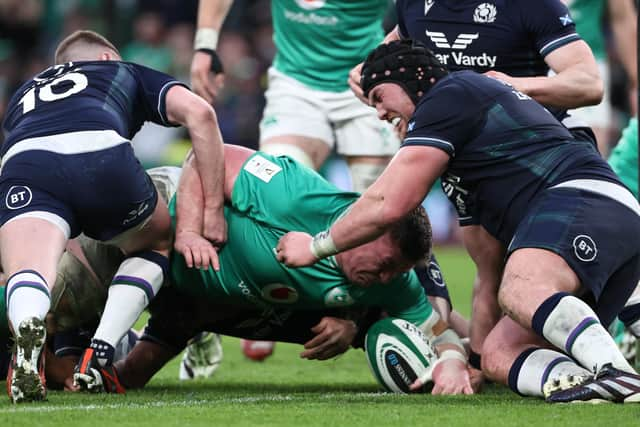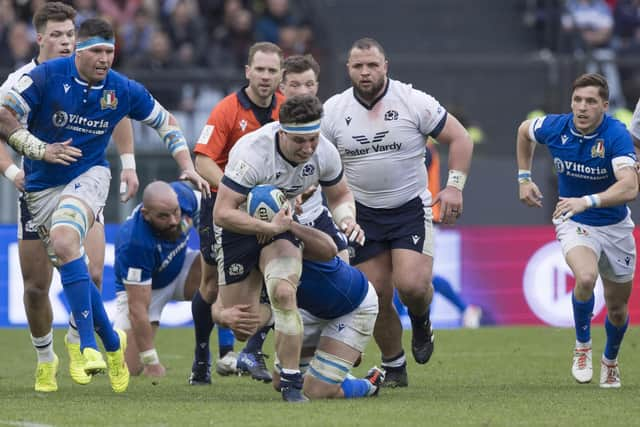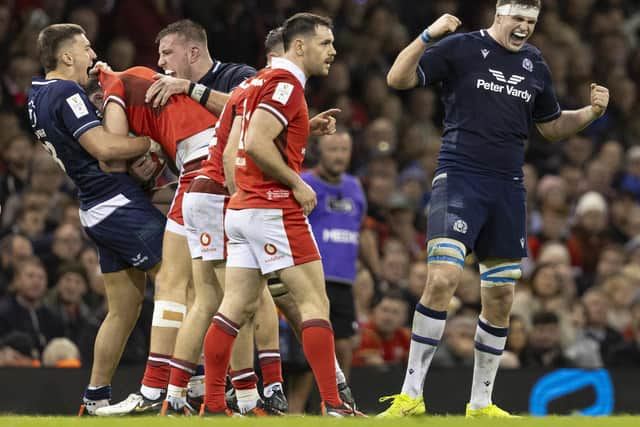Fraser Brown: False narrative has developed around Scotland's 'golden generation' - I don't agree with two-year claim
The Six Nations is such a short tournament, it’s what makes it so compelling and one of the best sporting competitions in the world.
Three weeks ago, Ireland were seen as the best side in the tournament, and confirmation finally came as they lifted the title in Dublin on Saturday. And while some things stay the same, most don’t. Scotland had been considered ‘Best of the Rest’ behind Ireland but it’s fair to say that tag slipped over the final two weekends. It’s less than a month since the dismantling of England in Edinburgh but the mood music around Scotland has changed completely. There is talk of a regression after two wins from five, there are concerns over poor discipline, in fact, the worst discipline in the tournament, and a faltering attack against both Italy and Ireland.
Advertisement
Hide AdAdvertisement
Hide AdWhat is true is that there were moments of sheer brilliance, moments of breathlessness, moments of disbelief and, yes, moments of despair.


It’s easy to criticise and there will always be the ‘what if?’ moments. What if Duhan van der Merwe hadn’t been held up at the death against Wales, if the try against France had been given, if Scotland had stuck to the template that had worked so well for them in the first 25 minutes against Italy? What this tournament has shown is just how close all the teams have become. A decision either way, a dropped ball, a missed kick – the margins have become so small and that can only be a good thing for the Six Nations going forward.
Scotland scored some brilliant tries but a lot of them came from counterattacks. They come alive in those moments around unstructured play, it brings the best out of the threats they have across the backline, but when they get into their phase shape, they struggle to break down teams and there was some really poor decision-making. One obvious example, and there are many, was during the second half against Ireland after Scotland had forced an error after a long period of defending in their own 22. Ireland knocked on around halfway and rather than grasping the opportunity to build some pressure with the ball, the Scots immediately gifted possession back with a no-look offload from a wide ruck.
Ball retention is so precious, particularly against Ireland. They starve you of possession and you must utilise every scrap you get. It was careless and unfortunately it happened on more than one occasion. It looked as if some of the players felt the need to produce a miracle offload rather than digging in, putting together some phases and building pressure with possession.
One area where Scotland deserved huge credit against Ireland was their defence which looked like it was creaking at times against Italy. Scotland turned it around in seven days after Rome and put in one of the best defensive performances I’ve seen against an Ireland team over the last three years. I don’t just mean the last-ditch stuff. They were physical and powerful. Ireland had so much possession in the first half but they couldn’t break Scotland down. Scotland kept them at arm’s length outside their 22 and they were aggressive, had two in each tackle and got back on their feet quickly, slowing down Ireland’s speed of ball. This gave them time to fill the field, get their heads up and make brilliant reads on the Irish block plays. There were times Jack Crowley just kicked the ball away aimlessly because he couldn’t find a way to break down Scotland. So from a defensive point of view, that was the ideal blueprint for Scotland. That’s the benchmark.


In attack, there is work to be done. I struggle to see how Scotland are trying to attack at times other than generate quick ball and get it to strike runners in width. There are multiple threats in the back line of course and it has worked at times, Huw Jones’ try on Saturday came out of a piece of individual brilliance, but good defences aren’t troubled when they’re not forced to make decisions. The other issue is what happens when those players are not in the game – and Scotland sometimes have a problem with getting them involved enough – or when they are shut down one-on-one. How do they break teams down?
Some pundits have been quick to talk down Scotland since the Ireland game, suggesting time is running out for this so-called ‘golden generation’. I have a real issue with this ‘golden generation’ tag. People have said it’s the best crop of players Scotland have ever had, and that’s probably true for the professional era, but it’s grown arms and legs and become this unwanted label.
It’s a team that’s evolving all the time. They need to win more, and I say that as someone who was in the team a year ago and who underperformed. We should have won more last year, and we should have won more this year but I don’t think you can call it a golden generation. A false narrative has developed around this which says that time is running out for this team because there is no-one coming through to replace them.
Advertisement
Hide AdAdvertisement
Hide AdPeople point to the pathway system and I know our under-20s are not performing as we would like, but anyone who has watched them this season knows they are playing a lot better than last year. The results haven’t reflected that. Against Ireland on Friday they were the better team for 35 minutes of the first half and should have scored one, possibly two tries. As with all under-20 teams in Scotland, there is not the depth and it showed in the last 15 minutes in Cork. There were similarly good spells for our under-20s against Wales, England and Italy so to say the state of the under-20s is the reason that this is the last chance for the main Scotland team is nonsense.


If you go back over the years I think there has only been a few seasons where our U20s have won three games in a championship, one of them being 2009 in the team I played in. So it’s not as if we have been challenging at the top end at under-20 level year in year out but Scotland have still managed to produce two or three players from this group most seasons who go on to play for the national team.
Yes, our age-grade pathway needs to get much better, but it still produces. The main Scotland squad is a very talented group and there will be more good players who come through, so talking about the end being near for this so-called ‘golden generation’ is a load of rubbish. I’ve heard pundits say the current side has two years left to win something but I wouldn’t agree.
Of course, we all know that Finn Russell can’t go on forever and he will be a huge loss when he does step away because he’s such an unbelievable talent. No other tens have had much game-time but I think Ben Healy will get some on the summer tour. And Adam Hastings, if he can get himself fit, should also come back into contention and he’s an excellent stand-off.
There is a question around who is going to take the team forward after Finn, or if Finn were to be injured. So much of Scotland’s attack revolves around him, so I think others need to step up and get themselves involved in the game off their own bat rather than relying on him. Scotland need to find more depth in some positions and the summer tour will be good for that.


I thought our scrum was depowered when George Turner and Pierre Schoeman went off at the weekend so that’s an area where we need to develop more options. Scrummaging skills are essential but players need time to develop them and that requires game time.
In the second row, the tour could also be an opportunity for Alex Samuel and Max Williamson to step up and I’ve been impressed by both of them at Glasgow. Over at Edinburgh, Marshall Sykes and Glen Young could do with some exposure at international level because we have to acknowledge that it’s an ageing second row and the likes of Richie Gray and Grant Gilchrist won’t go on forever. The tour could be a good opportunity to reintegrate Jonny Gray if he can get himself back fit.
We are well stocked with back-rows and Andy Christie has been a big success. At centre, it’s an opportunity to give Stafford McDowall more game-time, and maybe bring Rory Hutchinson and Cam Redpath back in. It’s a big tour for Scotland because there needs to be some depth created and it’s a chance to look beyond the tried and tested.
Comments
Want to join the conversation? Please or to comment on this article.
